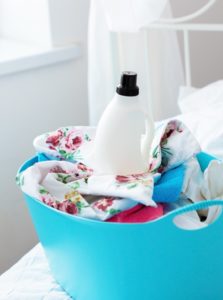
When cleaning your clothes in the washing machine, you most probably add some sort of fabric conditioner. However, you probably don’t know that it is actually not a vital part of the cleaning process. Yes, commercial fabric conditioners are widely popular and the many years of marketing have probably convinced you that you must use them. In fact, it not only is not necessary but there are some downsides to using it. Here is what they are:
1. Fabric conditioners are not great for the environment. These products often contain a number of non-renewable petroleum-based chemicals that are not biodegradable. Not just that, but fabric softeners also contain some carcinogens and chemicals that might contribute to eczema, as well as allergens that can be harmful to aquatic life when washed down the drain.
2. It can damage some clothes or towels. Fabric conditioner leaves a thin, waxy residue layer on your fabrics, which in order to survive through the washing process, has to be waterproof. This layer will lessen the absorbent ability of your clothing and cause them to be softer. However, it will make them not so responsive to washing, and more likely to lock in bad odours. That happens to nylon clothing especially. Your towels may become less absorbent over time and your sweat-resistant sportswear may suffer too. Fabric softeners can also be harmful to bamboo and cotton garments.
3. It is bad for your washing machine and plumbing. As it is petroleum-based and contains fats, fabric softener might end up clogging your washing machine and pipes.
Due to the animal fats in the product, mould growth will be encouraged. When exposed to air and moisture, the fabric conditioner becomes the perfect environment for mould and bacteria. What makes the matter worse, is the water-resistant property of the product that will leave a residue on the inside of your washing machine as well, causing more mould to build up there.
4. It is not vegan-friendly. Most fabric conditioners actually contain a lot of animal fat that comes from suet – the fatty tissue around the kidneys of cattle and sheep. If you prefer to use cruelty-free or vegan products, you may want to stop using the store-bought fabric conditioner you have in your cupboard right now.
If you are thinking of turning to green cleaning or you read this and want to ditch commercial fabric softeners, do not worry. We will share a wonderful natural safe alternative to this product. It is perfect for people with sensitive skin, it is so much better for your clothing, washing machine and your overall health. You only need two ingredients that are inexpensive and are usually found in every household.
This DIY fabric softener contains vinegar which will kill mould bacteria, help brighten your clothes, cut through stains and grease and leave your fabrics soft.
Here is what you need:
- 500ml white vinegar
- 30 drops of your favourite essential oil
- 500ml spritz bottle
How to use:
Mix the solution in the spritz bottle and always shake well before using. When loading your washing machine, fill the fabric softener drawer up to the line with the scented vinegar. For half a load, reduce the amount of the product by half as well.
Do not worry about the vinegar smell, it will not stay. At the end of your washing cycle, you will end up with a clean, fresh, nice-smelling bunch of clothes. If there is a trace of vinegar smell on your wet clothes, rest assured that it will be gone by the time they are dry.
We suggest you use lemon and sweet orange essential oil for a fresh aroma. However, it is completely up to your preference. You can also skip the essential oil for an aroma-free conditioner.
The acidic nature of vinegar is great for cutting through limescale and soapy residue, dissolving grease and stains and whitening your whites. You can use it when cleaning coloured clothing as well since it will not damage the fabric.
When using vinegar, you not only condition your clothes and keep them cleaner and brighter, but you are also cleaning your washing machine at the same time as it will remove all bad odours, bacteria, and mould and dissolve all soapy residue.
You are gaining so many benefits by switching to this homemade fabric softener. Your washing machine will be cleaner, your pipes will be safe, your clothes will be softer, smell great and not be covered in residue that will damage their fibres and cause them to smell bad. The best part? You will be able to save money since you won’t be buying expensive commercial solutions and making your own instead.
